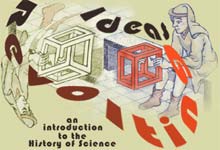
University of California, Irvine
Instructor: Dr. Barbara J. Becker

|
Week 9. Natural Selection excerpts from
|
| "AWFUL CHANGES"
by Henry de la Beche (1830)
"You will at once perceive," continued Professor Ichthyosaurus, "that the skull before us belonged to some of the lower order of animals; the teeth are very insignificant, the power of the jaws trifling, and altogether it seems wonderful how the creature could have procured food." |
[The cartoon, "Awful Changes," was drawn by geologist Henry de la Beche to poke fun at one of Charles Lyell's more controversial ideas: cyclical patterns observed in the geologic record mean that Earth's biological history might be cyclical as well. Lyell went so far as to suggest that some day, when the conditions are right, "the huge iguanodon might reappear in the woods, and the ichthyosaur in the sea, while the pterodactyle might flit again through umbrageous groves of tree-ferns...." In his cartoon, De la Beche shows one such future ichthyosaur lecturing his attentive reptilian audience on what might be inferred about the life and habits of the creature--perhaps Lyell himself?--whose skull has been unearthed.]In October 1838, that is fifteen months after I had begun my systematic enquiry, I happened to read for amusement Malthus on Population, and being well prepared to appreciate the struggle for existence which everywhere goes on from long-continued observation of the habits of animals and plants, it at once struck me that under these circumstances favourable variations would tend to be preserved, and unfavourable ones to be destroyed. The result of this would be the formation of a new species. Here, then, I had at last got a theory by which to work....
|